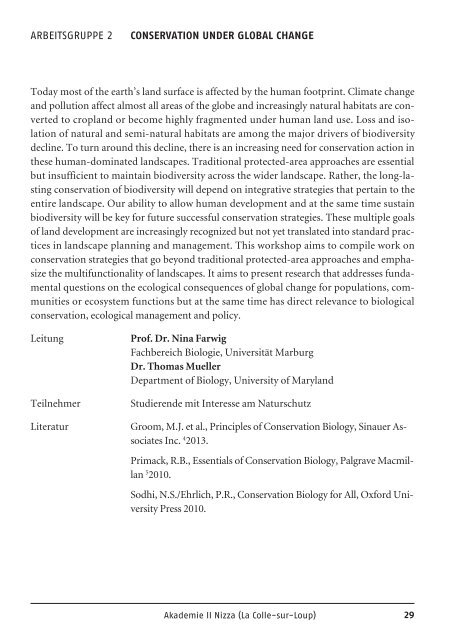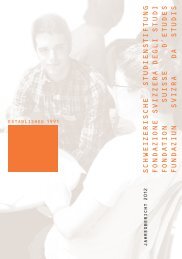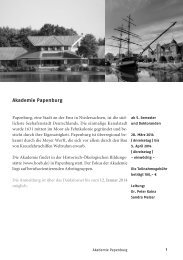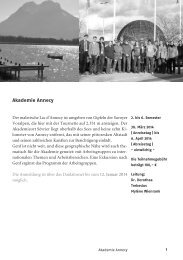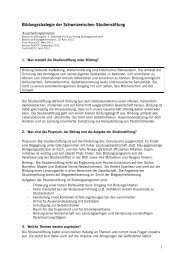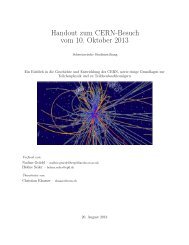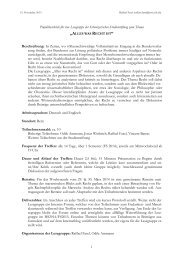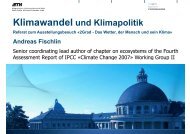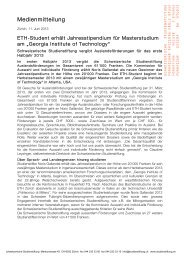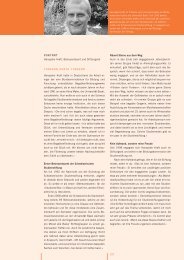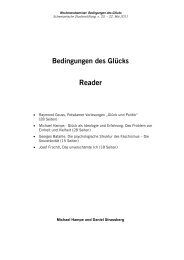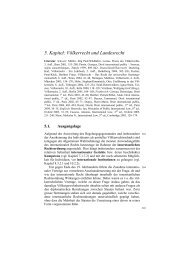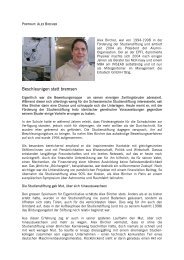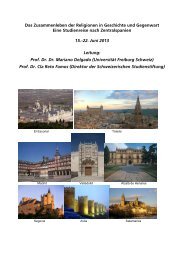Sommerakademien der deutschen Stiftung - Studienstiftung.ch
Sommerakademien der deutschen Stiftung - Studienstiftung.ch
Sommerakademien der deutschen Stiftung - Studienstiftung.ch
Sie wollen auch ein ePaper? Erhöhen Sie die Reichweite Ihrer Titel.
YUMPU macht aus Druck-PDFs automatisch weboptimierte ePaper, die Google liebt.
Arbeitsgruppe 2<br />
Conservation un<strong>der</strong> global <strong>ch</strong>ange<br />
Today most of the earth’s land surface is affected by the human footprint. Climate <strong>ch</strong>ange<br />
and pollution affect almost all areas of the globe and increasingly natural habitats are converted<br />
to cropland or become highly fragmented un<strong>der</strong> human land use. Loss and isolation<br />
of natural and semi-natural habitats are among the major drivers of biodiversity<br />
decline. To turn around this decline, there is an increasing need for conservation action in<br />
these human-dominated landscapes. Traditional protected-area approa<strong>ch</strong>es are essential<br />
but insufficient to maintain biodiversity across the wi<strong>der</strong> landscape. Rather, the long-lasting<br />
conservation of biodiversity will depend on integrative strategies that pertain to the<br />
entire landscape. Our ability to allow human development and at the same time sustain<br />
biodiversity will be key for future successful conservation strategies. These multiple goals<br />
of land development are increasingly recognized but not yet translated into standard practices<br />
in landscape planning and management. This workshop aims to compile work on<br />
conservation strategies that go beyond traditional protected-area approa<strong>ch</strong>es and emphasize<br />
the multifunctionality of landscapes. It aims to present resear<strong>ch</strong> that addresses fundamental<br />
questions on the ecological consequences of global <strong>ch</strong>ange for populations, communities<br />
or ecosystem functions but at the same time has direct relevance to biological<br />
conservation, ecological management and policy.<br />
Leitung<br />
Teilnehmer<br />
Literatur<br />
Prof. Dr. Nina Farwig<br />
Fa<strong>ch</strong>berei<strong>ch</strong> Biologie, Universität Marburg<br />
Dr. Thomas Mueller<br />
Department of Biology, University of Maryland<br />
Studierende mit Interesse am Naturs<strong>ch</strong>utz<br />
Groom, M.J. et al., Principles of Conservation Biology, Sinauer Associates<br />
Inc. 4 2013.<br />
Primack, R.B., Essentials of Conservation Biology, Palgrave Macmillan<br />
5 2010.<br />
Sodhi, N.S./Ehrli<strong>ch</strong>, P.R., Conservation Biology for All, Oxford University<br />
Press 2010.<br />
Akademie II Nizza (La Colle-sur-Loup) 29


